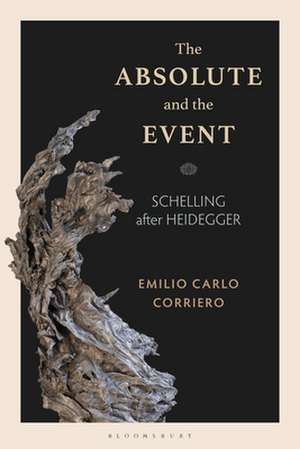The Absolute and the Event: Schelling after Heidegger
Autor Emilio Carlo Corrieroen Limba Engleză Hardback – 15 apr 2020
| Toate formatele și edițiile | Preț | Express |
|---|---|---|
| Paperback (1) | 216.16 lei 6-8 săpt. | |
| Bloomsbury Publishing – 20 oct 2021 | 216.16 lei 6-8 săpt. | |
| Hardback (1) | 593.95 lei 6-8 săpt. | |
| Bloomsbury Publishing – 15 apr 2020 | 593.95 lei 6-8 săpt. |
Preț: 593.95 lei
Preț vechi: 855.94 lei
-31% Nou
Puncte Express: 891
Preț estimativ în valută:
113.68€ • 117.15$ • 95.97£
113.68€ • 117.15$ • 95.97£
Carte tipărită la comandă
Livrare economică 01-15 martie
Preluare comenzi: 021 569.72.76
Specificații
ISBN-13: 9781350111431
ISBN-10: 1350111430
Pagini: 192
Dimensiuni: 156 x 234 mm
Greutate: 0.27 kg
Editura: Bloomsbury Publishing
Colecția Bloomsbury Academic
Locul publicării:London, United Kingdom
ISBN-10: 1350111430
Pagini: 192
Dimensiuni: 156 x 234 mm
Greutate: 0.27 kg
Editura: Bloomsbury Publishing
Colecția Bloomsbury Academic
Locul publicării:London, United Kingdom
Caracteristici
Corriero is a rising star in continental philosophy, deeply grounded in the German, English, and Italian philosophical traditions
Notă biografică
Emilio Carlo Corriero is Assistant Professor of Philosophy at the University of Turin, Italy.
Cuprins
Introduction1. A New Beginning for Western Philosophy: after Schelling and Nietzsche2. Heidegger's Reading of Schelling3. The Unyielding Excess of Being4. The Positive Beyond the Presence5. Being that can (make happen) being Index
Recenzii
From Schelling to Nietzsche and back again. That is the path indicated by Heidegger and retraced in an original way by Corriero, who in this book masterfully reconstructs the suggestive affinities between Heidegger's Event and Schelling's Absolute.
This important study turns to the late Schelling's "positive philosophy" to cast new light on Heidegger's own path of thinking, especially his turn to das Ereignis (the event). It is a significant development in our appreciation of Heidegger and it also demonstrates the continuing importance of the rediscovery of Schelling as one of the most indispensable of the early Continental thinkers.
This book is clearly the richest account of Heidegger's appropriation of Schelling's philosophizing yet written. In an important contribution to this century's Schellingian revival, Corriero, a subtle master of the history of modern thought, compellingly argues that Schelling's persistent reconception of nature presciently provides contemporary metaphysics with the ontogenetic means to survive the ruins of ontology over which Heidegger has for so long presided.
This important study turns to the late Schelling's "positive philosophy" to cast new light on Heidegger's own path of thinking, especially his turn to das Ereignis (the event). It is a significant development in our appreciation of Heidegger and it also demonstrates the continuing importance of the rediscovery of Schelling as one of the most indispensable of the early Continental thinkers.
This book is clearly the richest account of Heidegger's appropriation of Schelling's philosophizing yet written. In an important contribution to this century's Schellingian revival, Corriero, a subtle master of the history of modern thought, compellingly argues that Schelling's persistent reconception of nature presciently provides contemporary metaphysics with the ontogenetic means to survive the ruins of ontology over which Heidegger has for so long presided.
